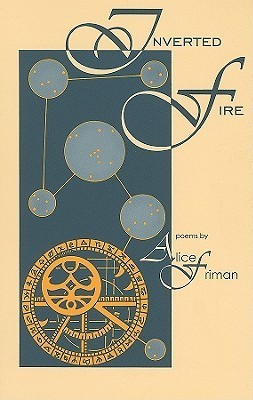In her Oct. 9, 2019 essay in The Paris Review, Naja Marie Aidt writes of how poetry and language make it possible to understand omens in retrospect, by allowing us to move freely in time “while linear time is suspended as you write and a corner of the future becomes visible in a brief and mystical moment.”
Alice Friman is a time traveler in her 1997 book, Inverted Fire, and in reading it, so was I. Across four distinct sections—titled Libra, The Moon, Black Hole and Red Shift, all astrological or astronomical terms—Friman explores humanity as part of a much larger universe, but also that universe as a giant metaphor for life, death and everything in between.
With evocative detail, Friman gives us poems that echo scars of childhood, as well as the consciousness of time and death, that follow her speaker, and us, throughout adulthood. At the same time, she consistently reflects on what it means to age, and the inevitability of random violence and tragedy.
Damage, emotional and physical, is a constant undercurrent in Friman’s work, as her poems telescope into not only her own past lives, but the lives of known and lesser-known historical or mythological figures (and art, often statuary). She captures fascinating aspects—truth is stranger than fiction aspects—of these lives and works of art, humanizing their origins and predicaments in unexpected ways, while simultaneously making us both ache and think: that could be us. We’re both of this world and the next in this collection, and the dichotomy resonates in every poem in the book.
In “The Bat,” as the world goes to sleep, as “all murderous intent / shuffles off to bed,” Friman asks:
What sweet baby talk
lays us down
that over our roof, our pillow,
the night will grind its wheel
while we—all star lights on—sleep
safe in its parking lot…
But whatever voice lulls us into false security is interrupted when a threat intrudes:
Then what
was the scream I pulled down
last night from the blind beating air,
smothered and stomped flat on the
blue carpet, grinding with my heel?
The speaker confronts the perceived threat of the bat by killing it, yet the violence she’s compelled to inflict, fails to satisfy her:
What was the innocent spot
oozed from its mouth that all
my scrubbing only makes brighter,
but the inner flash of a bluer wilder
spot that like a throw rug on a carpet,
like the day’s own blue face, fails to hide
the irredeemable black hole?
The collection’s opening poem, “Stars,” interestingly appears before the poems in the first section, providing immediate context: “Heraclitus said / stars are bowls of inverted fire.” Her speaker remembers the various ways stars appeared to her in different parts of Greece, then on a beach, where she clings to her companion, Alekos, saying his name until the moon rises, “bleaching the sky tame” while behind him the waves “hunched and groaned under their fallen cargo—the gleaming crockery of the drowned.”
She ends with:
Now, the sky is filled with ghosts:
ashes in the bottom of their bowls, too deep even for the winds
that prowl down the skies sniffing at rims,
howling for a wildness that burns.
But who is Alekos? Is he dead, or alive? Given that the Greek meaning of the name can convey protector/defender of men, one could posit that Alekos symbolizes a love object that the speaker clings to, a figurative metaphor for life itself. The speaker sees “broken” stars in his eyes, while, behind Alekos, the ocean both consumes, and is consumed by—think of how humans use crockery—the contents of the sky above it. The omen Friman gives us here is consistent with Heraclitis’s view that as a fire is kindled, an equal amount is extinguished.
In “Pockets,” Friman returns to her girlhood to contemplate not a black hole of celestial space, but an opening in her father’s pocket, imagining herself falling through the bottom, again and again, “hanging on / to the shredded edges as if life depended on it.” She tries, but fails, to reimagine her father as a vessel capable of holding her, we presume, in stability or in love, but in turn recognizes that, as a byproduct of her upbringing, she has inherited her father’s propensity to “hold onto nothing.” One wonders, reading, if the absence of a solid paternal relationship led to the writer’s development as someone who must constantly wrestle with what it means to belong to, to hold on to, someone or something. But in the last stanza of “Pockets,” Friman tells us that she does, in fact, save things. In the pocket of her new blue coat: “a dolly’s arm / a plastic yellow dog—toys picked up in gutters / lost from a child’s stash.” These castaway childhood toys are like talismans, which Friman fingers as she walks, imagining that by doing so, she somehow can still touch another child’s life “before the family disease eats away the lining.”
In the poem “Plums,” from the same section, Friman is the “silver dollar girl gone / down the slot of all mysteries” as she addresses the lifelong influence that an absent or a cruel parent can effect:
Admit it. For us the cruelest lesson
was read in a father’s eye
or overheard in a voice
coming through a bedroom wall.
Friman is in love with language, and understands its powers like few writers I have read. Her sensibility is not one of dire resignation to life’s difficulties, but rather that of a passionate observer and adventurer committed to seeing clearly, and to rendering, through language, her experience, that others might find a real-world space, a universe, of their own in her words.
One of my favorite poems in this book, probably because I can visualize myself having this experience, but also because so many of her themes are present here, is “Flight to Australia, 1989.” This piece begins the Moon section and re-creates the experience of a long journey across time zones, and, apropos, descriptions of the speaker’s fellow passengers: “The group from Vantage Tours / wear blow-up pillows around their necks / name tags with stars.” Have you been there? I have.
“Flying backwards / into the day after tomorrow,” she begins, and proceeds to consider:
…the invisible curve
we cling to, each in our ten-seat-across
row, huddled in blankets
balancing the cup/buttering the roll: the curve
that holds us to what matters: schedules,
children, the one in the yellow sweater
who kissed and clutched me goodbye.
The subjects and problems Friman tackles in this collection shed light on our own fears and pathologies. While there are undercurrents of heartache and wistfulness in these poems, present equally are poems that display the writer’s dark humor, ambitious imagination and perseverance. She will never, to paraphrase Dylan Thomas, go gently into that good night. For example, “Suppose, Suddenly” is one of those poems that caused me to sit upright, because, let’s face it, who hasn’t envisioned themselves in a do-or-die situation or experienced a moment when you realize how close you came to death, and how life itself is a miracle when we consider how what we perceive as safety can swiftly change. She opens with:
Suppose, suddenly you’re locked
in a telephone booth with a slasher.
If that doesn’t get your attention, in the adjacent poem, “40 degrees Below,” one of the shorter poems in the book, she evokes the Holocaust in lines that give us the fleeting recognition between mother and daughter on two trains running side by side, a joyous moment in the knowledge that the other lives, juxtaposed by the failed attempt to connect:
When Farenheit and Celsius,
tracked and locked in numbers, meet,
like long-lost relatives thought dead
(an experiment perhaps on the effects
of cold on the human body)—or worse:
two trains running side by side
but never together, mother and daughter
frantic for each other’s face, to know
for that moment the other lives
(would leap for that) and then
at last to reach out and grab on
before the fingers slipping, before
the hurtling to (who can imagine)
such showers and such heat.
An overarching concept in Inverted Fire is that, despite our fear of death and the ravages of aging, only by accepting the ultimate obliteration that awaits us all, and perhaps our universe—all stars, at some point, will burn out—can we grasp the dialectic that impermanence and permanence can co-exist.
In “Night Drive,” the final poem in the collection, Friman opens with a description of trees tossing clouds around while “the moon in her wedge of white make-up / leans back to hold us in her spotlight of hair.” She asks, “Where is defeat on such a night as this?” and answers:
Each pebble on the side of the road
shouts a victory in the flash of my headlights,
for I have come to the end of fifty-five years,
each one the eraser for the last, each one
a newly sharpened pencil jabbing me awake
to this picture—here and hung—on this night’s black wall.
Friman seems to tell us that no matter how much darkness surrounds us, immediately beyond that darkness is a flash of “white immediacy” that symbolizes the present world and the present moment, which we must embrace in order to live.
Footnotes:
*The description of Heraclitis’s philosophy is paraphrased in Introduction to Ancient Philosophy, by Don E. Marietta, Jr.
Alice Friman’s newest book, Blood Weather, is now available from LSU Press. From the publisher: “Blood Weather, Alice Friman’s sharply etched new collection of poetry, reminds readers that times of reckoning are marked by blood: the knife, the sword, the cutting word. Blood runs through our history, stories, religion, and art, and we cannot help but play our part by adding to the storm of ‘fang and claw’ and its inherent sorrow. Friman traces this unending path through biblical tales, the war of the sexes, the continuum of art, and her own family and personal life. Her poems reflect on figures ranging from Lady Macbeth—whom Friman sees in the blood-red tree outside her bedroom window—to Cain and Abel in the biblical account of the first murder, through Judge Judy’s frustrations when faced with the death of a marriage, to the poet herself as a child learning to read ‘the ancient writing of the butcher block / streaked with cuts and sacrifice’ and the butcher’s hands, ‘blunt-fingered and stained.’ By turns stark and resilient, the poems in Blood Weather draw on tragic themes and painful memories to evoke the tumult of human nature.”





